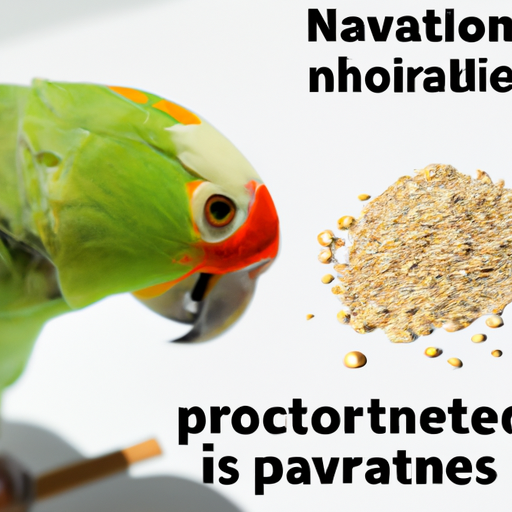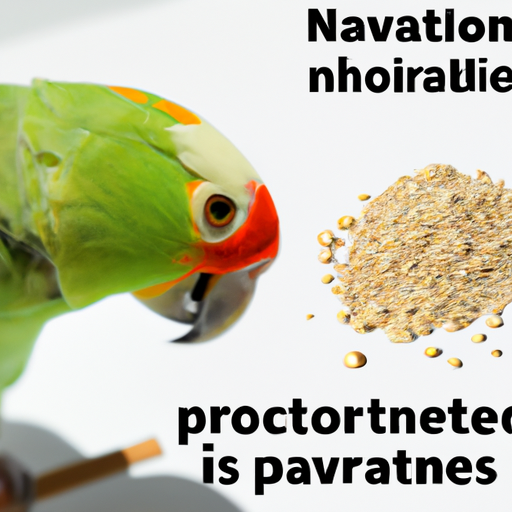
Parrots are vibrant, intelligent, and affectionate companions. Their bright plumage and engaging personalities make them a delightful addition to any household. However, ensuring their health and well-being can be challenging, particularly when it comes to their diet. Just like humans, parrots are susceptible to nutritional deficiencies, which can lead to a host of health problems. Understanding these deficiencies and how to prevent them is crucial for any parrot owner.
One of the most common nutritional deficiencies in parrots is a lack of Vitamin A. This vitamin is essential for maintaining healthy skin, feathers, and immune system function. A deficiency in Vitamin A can lead to respiratory infections, poor feather condition, and even vision problems. To prevent this, include foods rich in beta-carotene in your parrot’s diet, such as sweet potatoes, carrots, and dark leafy greens. These foods convert to Vitamin A in the body, providing the necessary nutrients for your feathered friend.
Calcium deficiency is another prevalent issue in parrots, particularly in egg-laying females. Calcium is vital for bone health, nerve function, and muscle coordination. A lack of calcium can result in weak bones, egg-binding, and seizures. To ensure your parrot gets enough calcium, provide a balanced diet that includes calcium-rich foods like kale, broccoli, and fortified pellets. Additionally, offering a cuttlebone or mineral block can help meet their calcium needs.
Protein is another crucial nutrient that parrots require for muscle maintenance, feather production, and overall health. A diet lacking in protein can cause poor feather quality, muscle wastage, and lethargy. High-quality sources of protein for parrots include cooked chicken, eggs, and legumes. It’s important to note that while seeds and nuts are high in protein, they should be given in moderation due to their high-fat content.
Parrots also need a variety of vitamins and minerals, which can be lacking in a seed-only diet. Vitamin D3 is particularly important, as it helps with calcium absorption and bone health. Parrots can synthesize Vitamin D3 from sunlight, so providing access to natural sunlight or a full-spectrum light can be beneficial. Additionally, offering a variety of fruits, vegetables, and specially formulated pellets can help ensure they receive a well-rounded diet.
Hydration is often overlooked but is equally important in preventing nutritional deficiencies. Fresh water should always be available to your parrot, and it’s essential to change it daily to prevent bacterial growth. Adding a few drops of apple cider vinegar to the water can also help maintain a healthy gut flora.
Monitoring your parrot’s health and behavior can provide early indications of nutritional deficiencies. Regular veterinary check-ups are crucial, as they can detect and address any issues before they become severe. A balanced diet tailored to your parrot’s specific needs, combined with regular health monitoring, can ensure that your feathered friend remains healthy and happy.
In conclusion, understanding the common nutritional deficiencies in parrots and how to prevent them is key to their well-being. By providing a varied diet rich in essential nutrients and monitoring their health, you can help your parrot live a vibrant, healthy life. After all, a well-nourished parrot is a happy parrot, ready to fill your home with joy and colorful chatter.


3 Comments
Thanks for sharing this! I knew about the calcium issue, but had no idea about the zinc deficiency. It’s tricky figuring out the right food balance. Any brand recommendations for supplements that are safe for parrots? 🤔🦜
Such a great read! I’ve been worried about my parrot’s diet recently, especially since he seems less energetic. This article really highlighted the importance of a balanced diet. Time to revise those meal plans! 🍽️🐦
Wow, this was super informative! I didn’t realize how common vitamin A deficiency was in parrots. I’ve been thinking of adding more carrots and sweet potatoes to my bird’s diet. Thanks for the tips! 🥕🦜